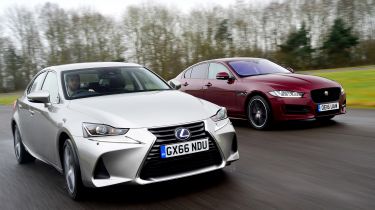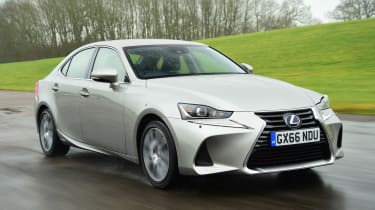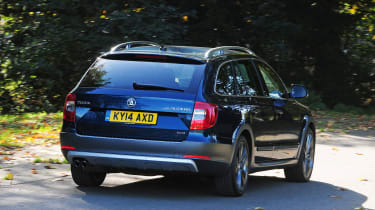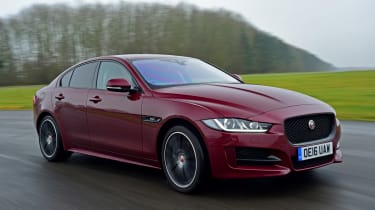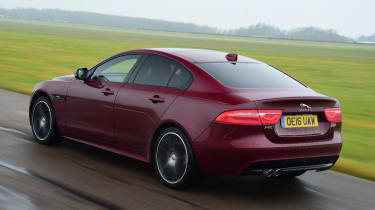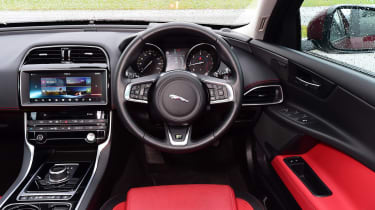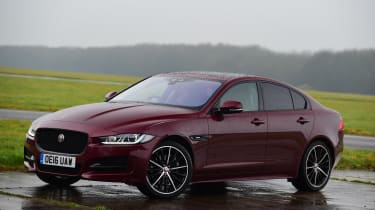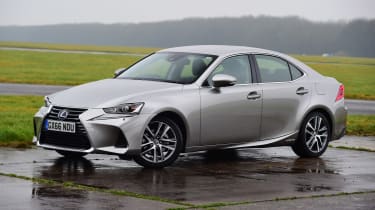Lexus IS vs Jaguar XE
The new Lexus IS adds more style to its hybrid package, but can it beat the Jaguar XE?
The compact executive class is highly competitive, with numerous models vying for buyers’ attention. One of the more leftfield choices is the Lexus IS, with its uniquely Japanese take on the small saloon formula, using innovative hybrid powertrains and focusing on build quality.
Yet after nearly four years on sale, the car has slipped behind the competition. In a bid to revive its fortunes, Lexus has refreshed the model with an extra dose of style, plus some slight tweaks to the driving experience and the interior.
Before the brand can pop the champagne corks, though, the IS must face our current class favourite: the Jaguar XE. Mixing style, quality, low running costs and bags of driving enjoyment, the Brit means business in this cut-throat sector.
Head-to-head
| Model: | Lexus IS 300h Advance | Jaguar XE 2.0d 180 Prestige |
| Price: | £33,695 | £33,025 |
| Engine: | 2.5-litre 4cyl petrol/electric motor | 2.0-litre 4cyl diesel |
| Power/torque: | 220bhp (combined)/221Nm | 178bhp/430Nm |
| Transmission: | Transmission: CVT automatic, rear-wheel drive | Eight-speeed automatic, rear-wheel drive |
| 0-60mph | 8.1 seconds | 8.2 seconds |
| Top speed: | 125mph | 140mph |
| Test economy: | 31.1mpg | 44.7mpg |
| CO2/tax | 101g/km/£20 | 111g/km/£30 |
| Options: | Metallic paint (£610) | Metallic paint (£635) |
Lexus IS
- • For: Great refinement, high-quality interior, sharp looks.
- • Against: Not very spacious, poor infotainment system, dull powertrain.
Buyers looking for an executive saloon that’s not powered by a diesel engine, but are unwilling to compromise on running costs, shouldn’t ignore the new Lexus IS. At a glance, they might not twig this is the latest version, though, as the changes to the lights and bonnet are subtle.
Used - available now

2023 Audi
Q4 Sportback e-tron
54,526 milesAutomaticElectric
Cash £23,363
2022 Kia
Niro
18,315 milesAutomaticPetrol1.6L
Cash £17,900
2023 Nissan
Juke
40,858 milesManualPetrol1.0L
Cash £12,287
2022 Volkswagen
T-Roc
36,779 milesAutomaticPetrol1.5L
Cash £18,600The 300h model tested here features a 2.5-litre four-cylinder petrol engine that’s supported by an electric motor, helping keep fuel usage and CO2 emissions to a minimum. The engine itself doesn’t feel particularly potent, as it’s set up for economy, but the combined petrol-electric output of 220bhp means it’s actually slightly faster than the Jaguar on the track, going from 0-60mph in 8.1 seconds. It was quicker from 50-70mph, too, taking 4.2 seconds – three tenths up on the XE.
Unfortunately, going from 50-70mph in the Lexus feels like much more of an ordeal than the XE, because of the CVT box. There are no gears as such, and the engine revs flare when you press the throttle, creating an unpleasant vacuum cleaner-like noise in the cabin while the revs build. This hurts the Lexus’s refinement, and the IS is slightly noisier inside at 70mph than the Jag, even though it will sit at just 1,300rpm at that speed.
While the official economy figures match the XE’s diesel engine, in the real world, we only managed 31.1mpg; the Jag returned 44.7mpg. Still, where the hybrid wins for running costs is with its company car tax bills, since the 101g/km Lexus will save top-rate earners around £500 a year.
The dull engine and CVT gearbox mean that the IS will never be able to match the XE as a driver’s car, either, as speeding up is so unpleasant. Ignore that, though, and the Lexus’s chassis is actually pretty good, with well weighted steering and decent body control in corners. The wheel just doesn’t provide much feel, and while it’s better than you expect, it can’t match the Jaguar here.
In normal driving, the Lexus is very comfortable, with the suspension revisions delivering a well judged ride, but that’s also thanks to the excellent seating position. It feels sporty without affecting access, and there’s plenty of adjustment, too. Plus, as the electric motor powers the car on its own at low speed, it’s smooth and quiet in traffic.
We’re big fans of the IS’s cabin, as it has a very high-quality finish and a neatly designed dash. It feels more spacious than the XE in the front, but there’s not as much legroom in the back. The other drawback to the Lexus’s interior is the dated infotainment system – only the flagship Premier gets the larger 10.3-inch unit from the RX SUV.
Testers’ notes:
- • Materials: There’s a high-quality finish throughout, with smart executive touches, such as the classy analogue clock and chrome accents.
- • Controls: Rotary dial control selects driving mode; upgraded Remote Touch interface is frustrating.
- • Position: There’s plenty of adjustment for the driver’s seat so it’s easy to get a comfortable position.
Jaguar XE
- • For: Great to drive, low running costs, stylish to look at.
- • Against: Less standard kit, fussy infotainment system, rattly diesel noise.
Buying an executive saloon is tough; there’s never been more choice. Our current favourite is the Jaguar XE, but there are some really worthy contenders from the German brands, while even the Alfa Romeo Giulia deserves a closer look.
Where the Jag gets it right is with its balance of abilities. Take the 178bhp diesel engine in our Prestige model here, for example: it’s a strong performer, managing 0-60mph at the track in 8.2 seconds. It’s fairly punchy in-gear, too, going from 50-70mph in 4.5 seconds in fifth.
The Jag doesn’t just settle for decent performance, though, and matches it with the promise of strong economy – our 44.7mpg figure on test beat the Lexus’s 31.1mpg return easily. And while the Jag’s 111g/km emissions are higher than the IS’s, private buyers will pay just £10 more a year in tax, at £30.
But while the Lexus is a little faster in a straight line, the Jaguar is much more fun to drive, thanks to its composed chassis, quick steering and lighter kerbweight. At the same time, the XE manages to feel smooth and refined on the road, and although the ride is a little on the firm side, it’s a small price to pay for the engaging handling.
At 70mph, the Jaguar sits at 1,700rpm, and despite being at higher revs than the petrol Lexus, it proved to be quieter at 70mph. Since many executive saloon buyers spend a lot of time pounding up and down motorways, that’s key.
The eight-speed automatic gearbox feels slightly lumpy at low speed, though. For example, when you’re pulling up to a roundabout and want to move away quickly into a gap, the transmission can feel slow to react. However, most of the time it’s smooth and responsive, even when driving more aggressively.
But because it has actual gears, as opposed to the continuously variable transmission (CVT) in the Lexus IS, you can gently accelerate with full control of the engine revs, particularly if you use the wheel-mounted paddles. That means the Jaguar feels more relaxed when you want it to, but also more enjoyable to drive quickly.
The driver sits nice and low in the XE’s cabin; the seating position is both comfortable and sporty-feeling, and the high-quality interior means the XE has an upmarket air. The touchscreen infotainment system is a bit fiddly, and it’s annoying that things like the heated seat controls have to be accessed through the screen, instead of a simple button on the console. It’s much more modern-looking than the dated system in the Lexus, however.
Testers’ notes:
- • Technology: Infotainment system is modern but can be a bit fiddly. Items like reverse parking camera are extra – they’re included on the Lexus.
- • Cabin: Interior feels slightly more cramped than its rival, due to the imposing centre console.
- • Materials: Cabin has a high-quality finish and is full of leather and colour-coordinated stitching.
Verdict
First place: Jaguar XE
Jaguar’s XE claims yet another road test victory, thanks to its all-round ability. The engine is flexible and economical, while the fun handling isn’t spoiled by a hard ride. It’s not the most practical buy and the infotainment system feels dated, but even this doesn’t deny the talented Jag.
Second place: Lexus IS
The Lexus IS is still a leftfield choice in the compact executive class. The quality cabin, relaxed low-speed driving experience and low CO2 will all appeal in their own way, but the IS just can’t beat the Jaguar XE as an all-rounder. However, it’s a handsome and interesting alternative.
